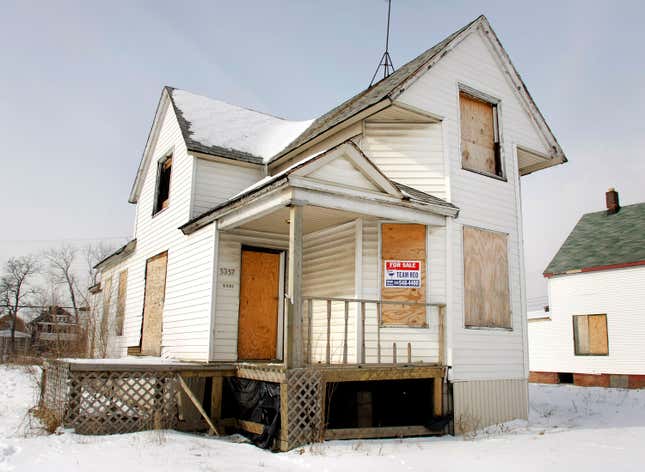
The city of Detroit, along with Wayne County and officials at the Michigan state tax commission, broke the law when it failed to notify in a timely matter tens of thousands of Detroit residents of their right to appeal tax assessments of their property that ended with many of them owing property tax balances they could not afford or losing their homes to illegal foreclosures, according to a class-action lawsuit, provided exclusively to The Root.
The lawsuit claims that, in 2017, the state of Michigan directed Detroit to complete a wholesale residential reappraisal, the first in 60 years. But, in the process, the city and the state failed to notify Detroit homeowners of their new property assessments until it became impossible for them to appeal.
Detroit homeowners were to receive a new assessment and the right to challenge it on or before February 15, 2017. Detroit, the lawsuit claims, delayed sending notices to them, mailing some 260,000 notices no earlier than February 14, 2017. “Knowing they sent all notices late, the Detroit Defendants made half hearted—and constitutionally inadequate—attempts to remedy the situation that sowed layer upon layer of legal error and public confusion. The litany of missteps the Detroit Defendants took severely exacerbated the resulting due process violation in 2017,” the lawsuit claims.
Consequently, Detroit homeowners that year had to accept the assessments and the property tax bills that came with them.
“The City’s failure eviscerated the due process rights of every Detroit homeowner in one blow,” the lawsuit, which was filed in the United States District Court for the Eastern District of Michigan, reads.
The results were disastrous. According to an investigation by the Detroit News, Detroit property owners were overtaxed more than $600 million “after it failed to accurately bring down property values in the years following the Great Recession.”
Here are some key finding from the investigation:
- Of 173,000 Detroit homes reviewed, more than 92 percent were over-assessed between 2010 and 2016, and overtaxed by an average total of $3,800. Nearly 96,000 of those properties were taxed twice as much as they should have been in at least one of those years.
- Of the over-assessed homes, city records show about 79,000 properties have had the same owner since 2010, meaning those homeowners bore the full brunt of the overtaxation. More are likely to have felt the impact because buyers often purchase homes with prior years of unpaid taxes they must pay.
- At least 59,000 homes that were overtaxed still have back taxes today—a total of $153 million, which includes interest and fees. Those same homes were overtaxed by at least $221 million over the seven years, according to the analysis.
The defendants named in the lawsuit include residents Flossie Byrd, William and Billie Hickey, Deborah Howard and Jeffrey Stevenson.
The Coalition for Property Tax Justice is the group leading the charge; Rami N. Fakhouri, Betsy Farrington and Samuel E. Schoenburg of Goldman Ismail Tomaselli Brennan & Baum LLP, of Chicago, is the law firm representing the plaintiffs in court.
As the Detroit News report and the lawsuit state, the city of Detroit tried to correct the issue by completing a state-ordered reappraisal of all residential properties in 2017, but Detroit residents were given foreclosure notices over excessive back taxes they didn’t actually owe.
“By denying homeowners an opportunity to appeal and lower frequently over-assessed property taxes, the Detroit government—including the City of Detroit; the Detroit Offices of the Chief Financial Officer and Assessor; and Mayor Michael Duggan and Assessor Alvin Horhn, acting in their official capacities (collectively the “Detroit Defendants”)—compounded a well-documented crisis that has plagued Detroit for years, leaving many homeowners no recourse but to pay more than they should owe, face delinquency, or even fall prey to property tax foreclosure,” the lawsuit argues.
The defendants, who include Detroit Mayor Mike Duggan, are also accusing Michigan of wrongdoing because, under its State Tax Commission (STC), it assumed control of Detroit’s property tax assessment process between 2014 through 2017. State Tax Commissioners W. Howard Morris and Leonard D. Kutschman, and STC Acting Executive Director David A. Buick, all acting in their official capacities, are also named in the lawsuit.
The complainants are seeking a wide range of relief, including a declaration that the city of Detroit and the state of Michigan violated the due process rights of the residents who didn’t have time to challenge the over-assessments of their homes, injunctions requiring the city and the state to guarantee timely service of property tax assessment notices in the future and to allow members of the class action lawsuit an opportunity to appeal their 2017 property taxes retroactively and damages for residents who paid too much in property taxes.



